Global Marketing Issues: Impact of Culture on Solar Product Launch
VerifiedAdded on 2023/04/08
|21
|4968
|94
Report
AI Summary
This report examines the global marketing challenges and opportunities for Victor Solar Products, a UK-based SME specializing in solar products, as it plans to expand into the Nigerian market. The report explores the impact of globalization on marketing activities, the influence of national culture, and the application of the marketing mix (product, price, place, promotion) within the context of launching solar products in Nigeria. It highlights the importance of understanding cultural differences, using Hofstede's cultural dimensions to compare the UK and Nigeria, and tailoring marketing strategies to the local market. The report analyzes the renewable energy industry background, company specifics, and provides recommendations for successful market entry, including product adaptation, pricing strategies, distribution channels, and promotional activities, to maximize the company's potential in the Nigerian market.
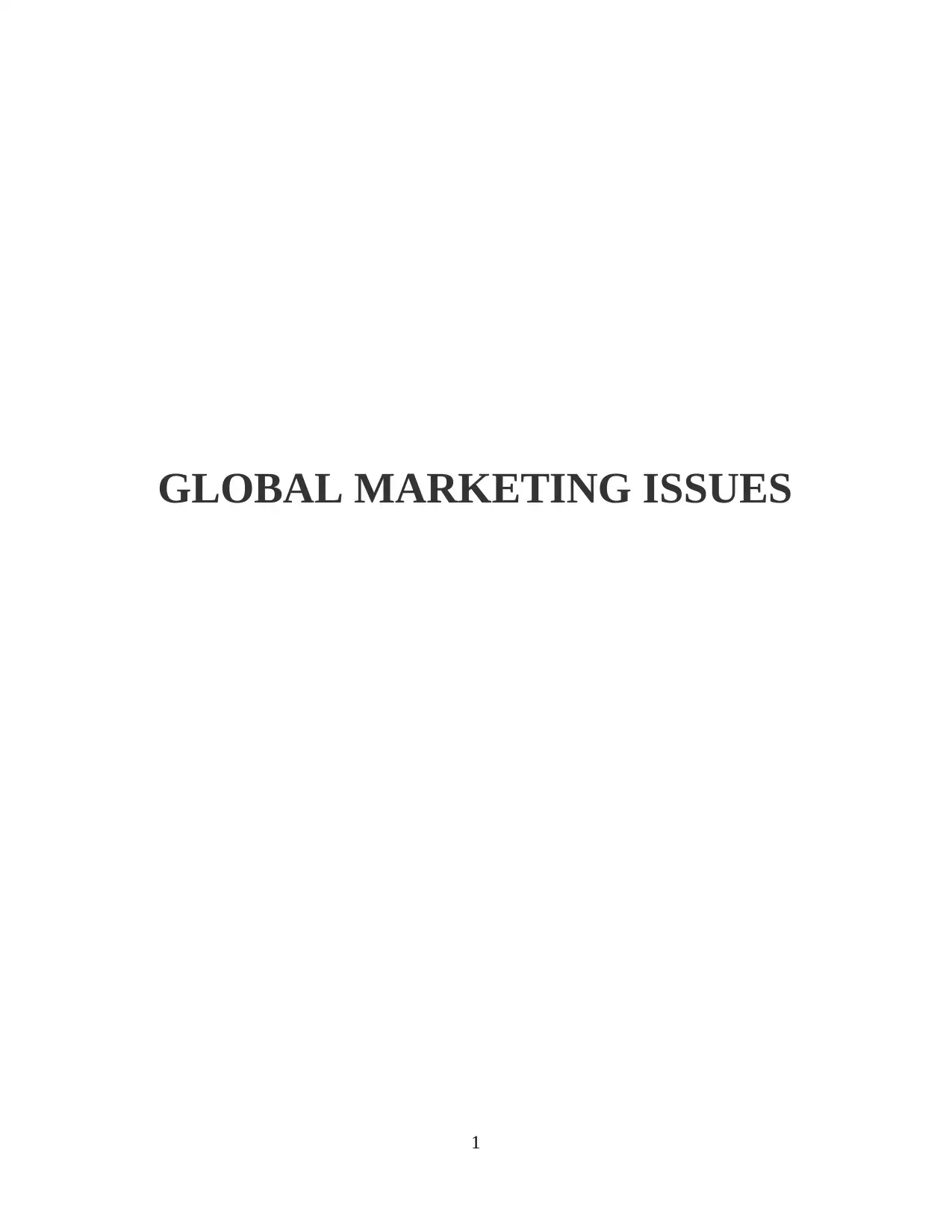
GLOBAL MARKETING ISSUES
1
1
Paraphrase This Document
Need a fresh take? Get an instant paraphrase of this document with our AI Paraphraser
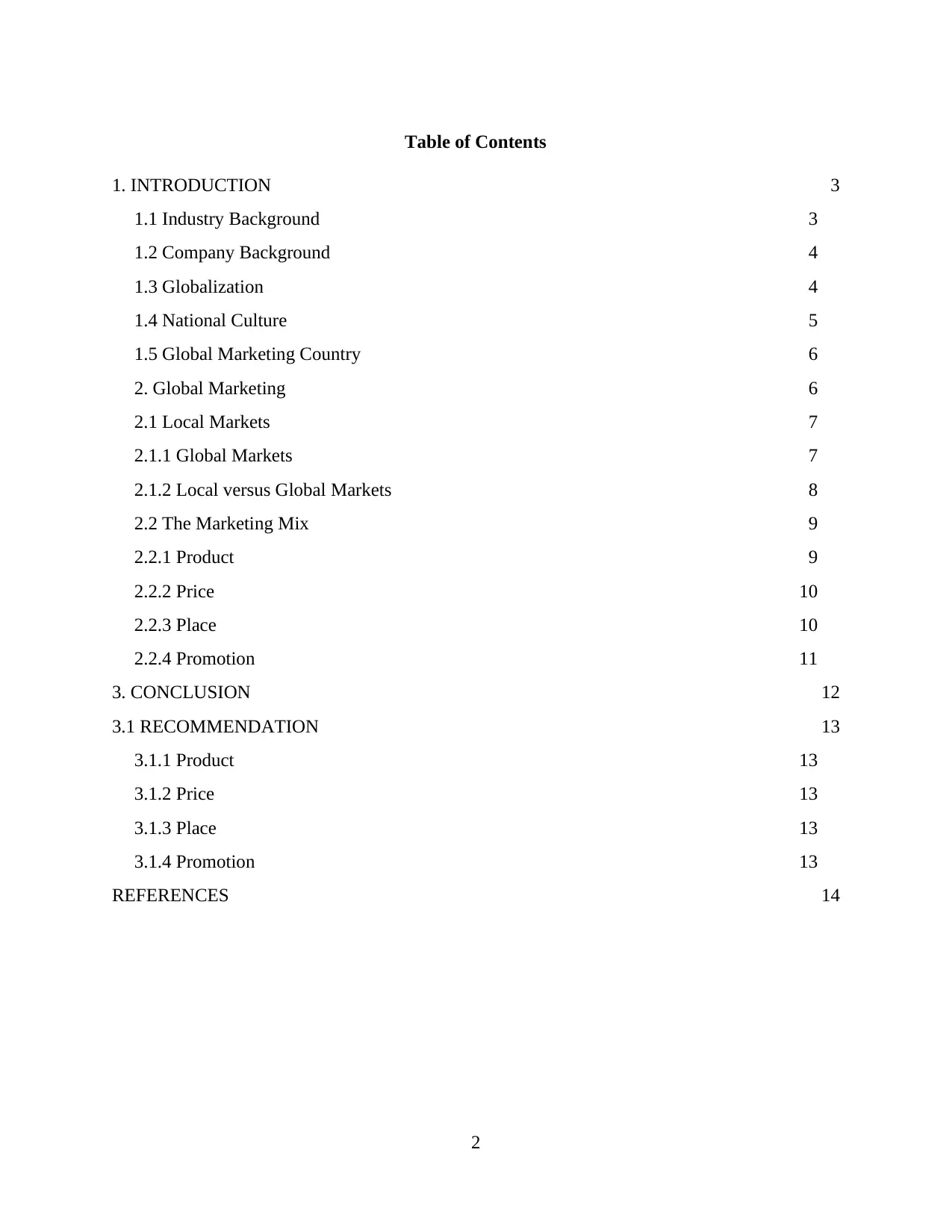
Table of Contents
1. INTRODUCTION 3
1.1 Industry Background 3
1.2 Company Background 4
1.3 Globalization 4
1.4 National Culture 5
1.5 Global Marketing Country 6
2. Global Marketing 6
2.1 Local Markets 7
2.1.1 Global Markets 7
2.1.2 Local versus Global Markets 8
2.2 The Marketing Mix 9
2.2.1 Product 9
2.2.2 Price 10
2.2.3 Place 10
2.2.4 Promotion 11
3. CONCLUSION 12
3.1 RECOMMENDATION 13
3.1.1 Product 13
3.1.2 Price 13
3.1.3 Place 13
3.1.4 Promotion 13
REFERENCES 14
2
1. INTRODUCTION 3
1.1 Industry Background 3
1.2 Company Background 4
1.3 Globalization 4
1.4 National Culture 5
1.5 Global Marketing Country 6
2. Global Marketing 6
2.1 Local Markets 7
2.1.1 Global Markets 7
2.1.2 Local versus Global Markets 8
2.2 The Marketing Mix 9
2.2.1 Product 9
2.2.2 Price 10
2.2.3 Place 10
2.2.4 Promotion 11
3. CONCLUSION 12
3.1 RECOMMENDATION 13
3.1.1 Product 13
3.1.2 Price 13
3.1.3 Place 13
3.1.4 Promotion 13
REFERENCES 14
2
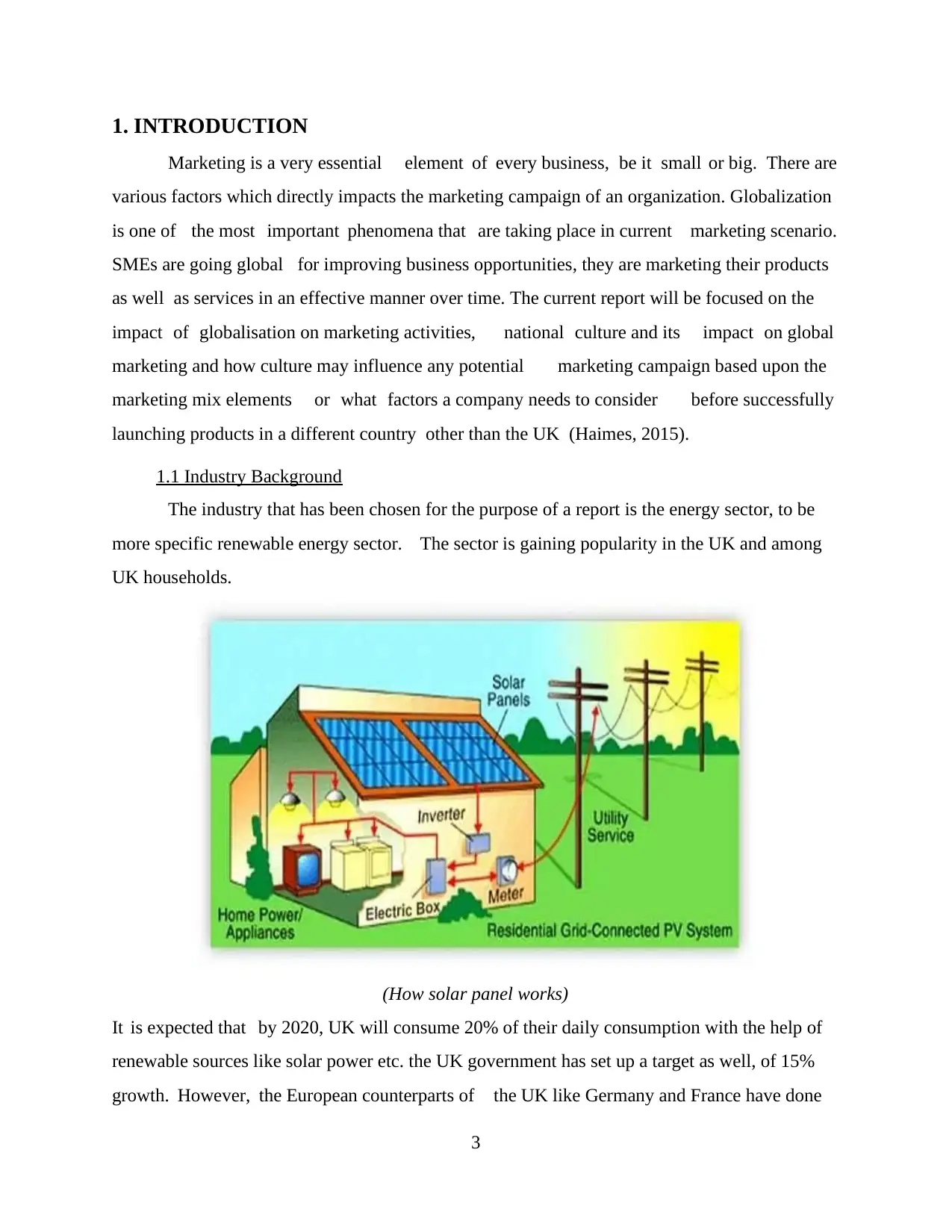
1. INTRODUCTION
Marketing is a very essential element of every business, be it small or big. There are
various factors which directly impacts the marketing campaign of an organization. Globalization
is one of the most important phenomena that are taking place in current marketing scenario.
SMEs are going global for improving business opportunities, they are marketing their products
as well as services in an effective manner over time. The current report will be focused on the
impact of globalisation on marketing activities, national culture and its impact on global
marketing and how culture may influence any potential marketing campaign based upon the
marketing mix elements or what factors a company needs to consider before successfully
launching products in a different country other than the UK (Haimes, 2015).
1.1 Industry Background
The industry that has been chosen for the purpose of a report is the energy sector, to be
more specific renewable energy sector. The sector is gaining popularity in the UK and among
UK households.
(How solar panel works)
It is expected that by 2020, UK will consume 20% of their daily consumption with the help of
renewable sources like solar power etc. the UK government has set up a target as well, of 15%
growth. However, the European counterparts of the UK like Germany and France have done
3
Marketing is a very essential element of every business, be it small or big. There are
various factors which directly impacts the marketing campaign of an organization. Globalization
is one of the most important phenomena that are taking place in current marketing scenario.
SMEs are going global for improving business opportunities, they are marketing their products
as well as services in an effective manner over time. The current report will be focused on the
impact of globalisation on marketing activities, national culture and its impact on global
marketing and how culture may influence any potential marketing campaign based upon the
marketing mix elements or what factors a company needs to consider before successfully
launching products in a different country other than the UK (Haimes, 2015).
1.1 Industry Background
The industry that has been chosen for the purpose of a report is the energy sector, to be
more specific renewable energy sector. The sector is gaining popularity in the UK and among
UK households.
(How solar panel works)
It is expected that by 2020, UK will consume 20% of their daily consumption with the help of
renewable sources like solar power etc. the UK government has set up a target as well, of 15%
growth. However, the European counterparts of the UK like Germany and France have done
3
⊘ This is a preview!⊘
Do you want full access?
Subscribe today to unlock all pages.

Trusted by 1+ million students worldwide
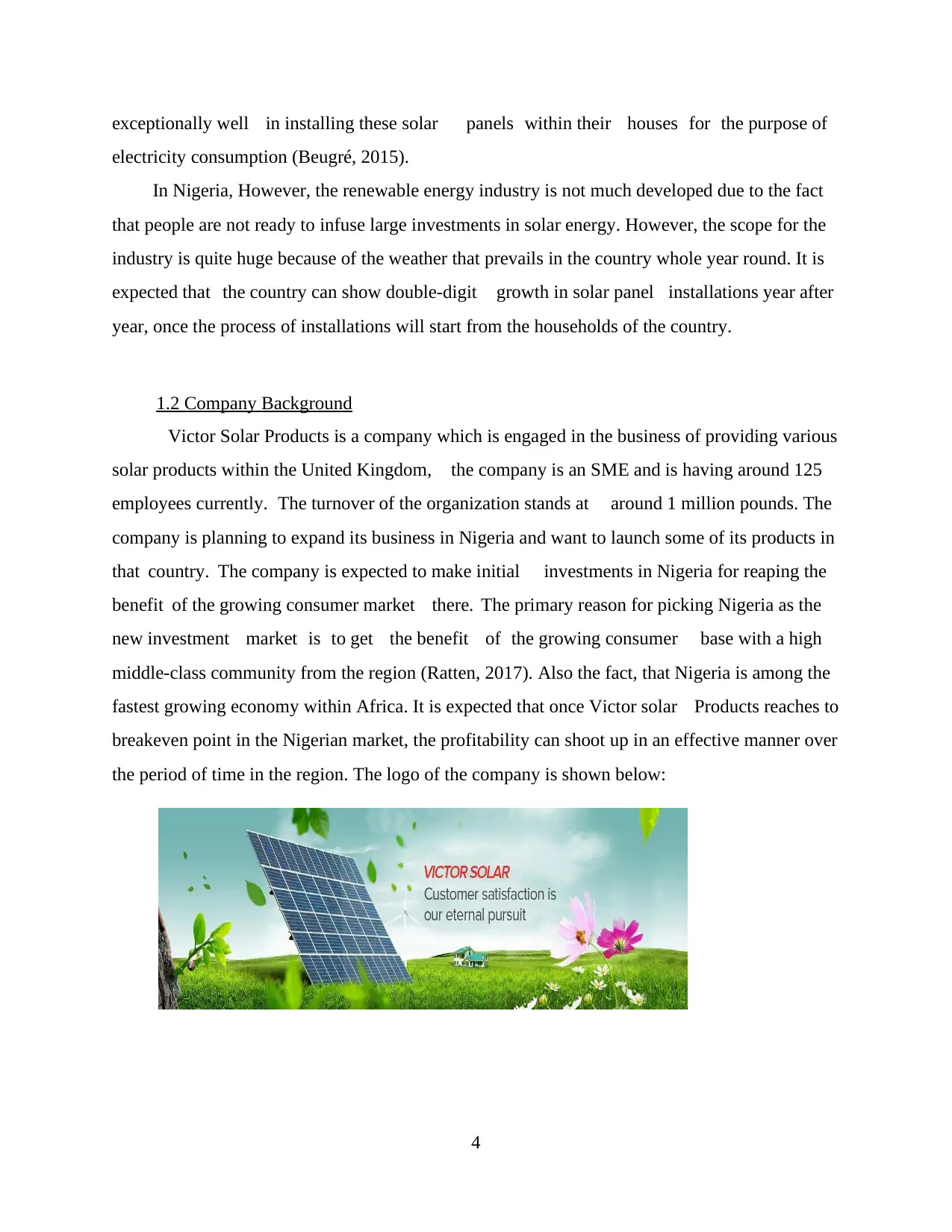
exceptionally well in installing these solar panels within their houses for the purpose of
electricity consumption (Beugré, 2015).
In Nigeria, However, the renewable energy industry is not much developed due to the fact
that people are not ready to infuse large investments in solar energy. However, the scope for the
industry is quite huge because of the weather that prevails in the country whole year round. It is
expected that the country can show double-digit growth in solar panel installations year after
year, once the process of installations will start from the households of the country.
1.2 Company Background
Victor Solar Products is a company which is engaged in the business of providing various
solar products within the United Kingdom, the company is an SME and is having around 125
employees currently. The turnover of the organization stands at around 1 million pounds. The
company is planning to expand its business in Nigeria and want to launch some of its products in
that country. The company is expected to make initial investments in Nigeria for reaping the
benefit of the growing consumer market there. The primary reason for picking Nigeria as the
new investment market is to get the benefit of the growing consumer base with a high
middle-class community from the region (Ratten, 2017). Also the fact, that Nigeria is among the
fastest growing economy within Africa. It is expected that once Victor solar Products reaches to
breakeven point in the Nigerian market, the profitability can shoot up in an effective manner over
the period of time in the region. The logo of the company is shown below:
4
electricity consumption (Beugré, 2015).
In Nigeria, However, the renewable energy industry is not much developed due to the fact
that people are not ready to infuse large investments in solar energy. However, the scope for the
industry is quite huge because of the weather that prevails in the country whole year round. It is
expected that the country can show double-digit growth in solar panel installations year after
year, once the process of installations will start from the households of the country.
1.2 Company Background
Victor Solar Products is a company which is engaged in the business of providing various
solar products within the United Kingdom, the company is an SME and is having around 125
employees currently. The turnover of the organization stands at around 1 million pounds. The
company is planning to expand its business in Nigeria and want to launch some of its products in
that country. The company is expected to make initial investments in Nigeria for reaping the
benefit of the growing consumer market there. The primary reason for picking Nigeria as the
new investment market is to get the benefit of the growing consumer base with a high
middle-class community from the region (Ratten, 2017). Also the fact, that Nigeria is among the
fastest growing economy within Africa. It is expected that once Victor solar Products reaches to
breakeven point in the Nigerian market, the profitability can shoot up in an effective manner over
the period of time in the region. The logo of the company is shown below:
4
Paraphrase This Document
Need a fresh take? Get an instant paraphrase of this document with our AI Paraphraser
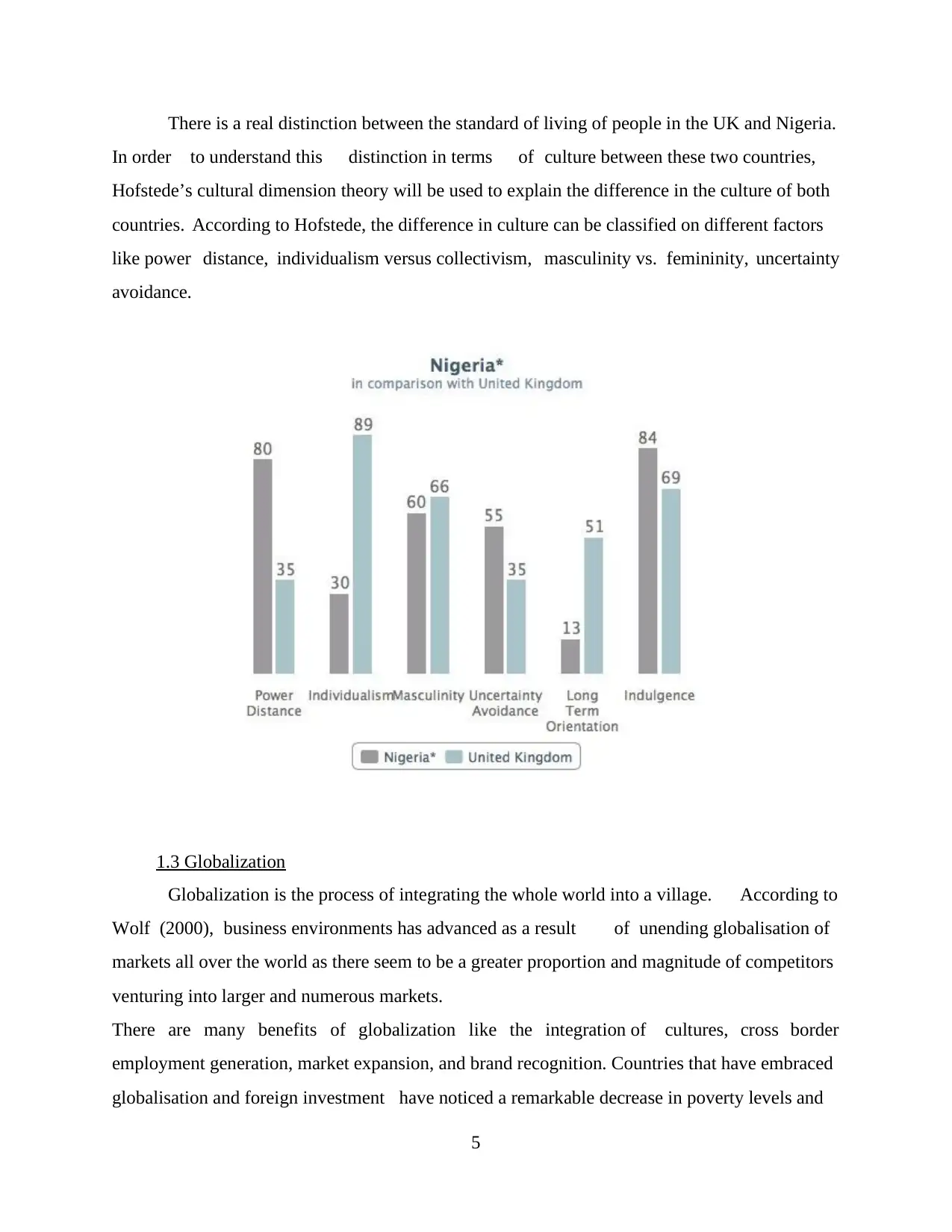
There is a real distinction between the standard of living of people in the UK and Nigeria.
In order to understand this distinction in terms of culture between these two countries,
Hofstede’s cultural dimension theory will be used to explain the difference in the culture of both
countries. According to Hofstede, the difference in culture can be classified on different factors
like power distance, individualism versus collectivism, masculinity vs. femininity, uncertainty
avoidance.
1.3 Globalization
Globalization is the process of integrating the whole world into a village. According to
Wolf (2000), business environments has advanced as a result of unending globalisation of
markets all over the world as there seem to be a greater proportion and magnitude of competitors
venturing into larger and numerous markets.
There are many benefits of globalization like the integration of cultures, cross border
employment generation, market expansion, and brand recognition. Countries that have embraced
globalisation and foreign investment have noticed a remarkable decrease in poverty levels and
5
In order to understand this distinction in terms of culture between these two countries,
Hofstede’s cultural dimension theory will be used to explain the difference in the culture of both
countries. According to Hofstede, the difference in culture can be classified on different factors
like power distance, individualism versus collectivism, masculinity vs. femininity, uncertainty
avoidance.
1.3 Globalization
Globalization is the process of integrating the whole world into a village. According to
Wolf (2000), business environments has advanced as a result of unending globalisation of
markets all over the world as there seem to be a greater proportion and magnitude of competitors
venturing into larger and numerous markets.
There are many benefits of globalization like the integration of cultures, cross border
employment generation, market expansion, and brand recognition. Countries that have embraced
globalisation and foreign investment have noticed a remarkable decrease in poverty levels and
5
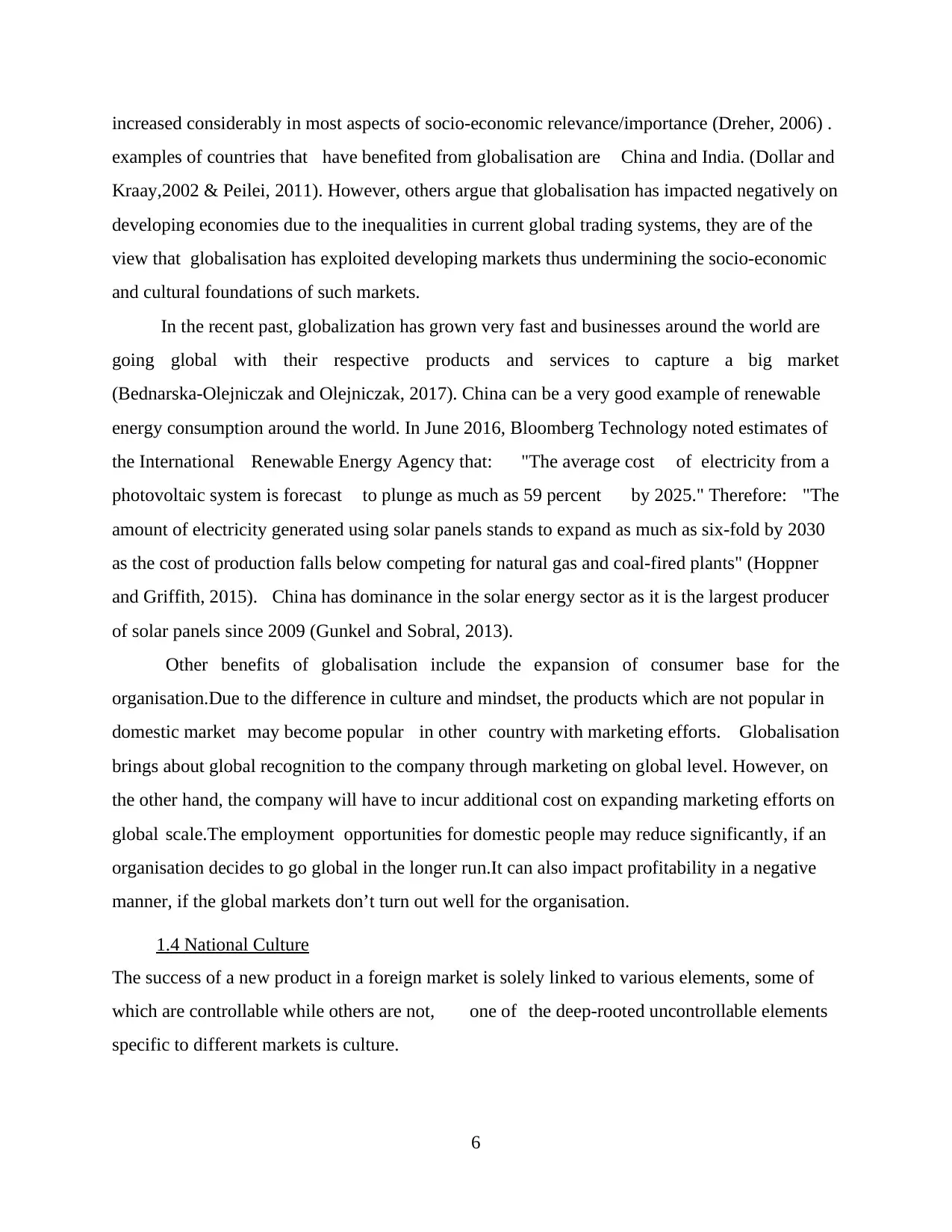
increased considerably in most aspects of socio-economic relevance/importance (Dreher, 2006) .
examples of countries that have benefited from globalisation are China and India. (Dollar and
Kraay,2002 & Peilei, 2011). However, others argue that globalisation has impacted negatively on
developing economies due to the inequalities in current global trading systems, they are of the
view that globalisation has exploited developing markets thus undermining the socio-economic
and cultural foundations of such markets.
In the recent past, globalization has grown very fast and businesses around the world are
going global with their respective products and services to capture a big market
(Bednarska-Olejniczak and Olejniczak, 2017). China can be a very good example of renewable
energy consumption around the world. In June 2016, Bloomberg Technology noted estimates of
the International Renewable Energy Agency that: "The average cost of electricity from a
photovoltaic system is forecast to plunge as much as 59 percent by 2025." Therefore: "The
amount of electricity generated using solar panels stands to expand as much as six-fold by 2030
as the cost of production falls below competing for natural gas and coal-fired plants" (Hoppner
and Griffith, 2015). China has dominance in the solar energy sector as it is the largest producer
of solar panels since 2009 (Gunkel and Sobral, 2013).
Other benefits of globalisation include the expansion of consumer base for the
organisation.Due to the difference in culture and mindset, the products which are not popular in
domestic market may become popular in other country with marketing efforts. Globalisation
brings about global recognition to the company through marketing on global level. However, on
the other hand, the company will have to incur additional cost on expanding marketing efforts on
global scale.The employment opportunities for domestic people may reduce significantly, if an
organisation decides to go global in the longer run.It can also impact profitability in a negative
manner, if the global markets don’t turn out well for the organisation.
1.4 National Culture
The success of a new product in a foreign market is solely linked to various elements, some of
which are controllable while others are not, one of the deep-rooted uncontrollable elements
specific to different markets is culture.
6
examples of countries that have benefited from globalisation are China and India. (Dollar and
Kraay,2002 & Peilei, 2011). However, others argue that globalisation has impacted negatively on
developing economies due to the inequalities in current global trading systems, they are of the
view that globalisation has exploited developing markets thus undermining the socio-economic
and cultural foundations of such markets.
In the recent past, globalization has grown very fast and businesses around the world are
going global with their respective products and services to capture a big market
(Bednarska-Olejniczak and Olejniczak, 2017). China can be a very good example of renewable
energy consumption around the world. In June 2016, Bloomberg Technology noted estimates of
the International Renewable Energy Agency that: "The average cost of electricity from a
photovoltaic system is forecast to plunge as much as 59 percent by 2025." Therefore: "The
amount of electricity generated using solar panels stands to expand as much as six-fold by 2030
as the cost of production falls below competing for natural gas and coal-fired plants" (Hoppner
and Griffith, 2015). China has dominance in the solar energy sector as it is the largest producer
of solar panels since 2009 (Gunkel and Sobral, 2013).
Other benefits of globalisation include the expansion of consumer base for the
organisation.Due to the difference in culture and mindset, the products which are not popular in
domestic market may become popular in other country with marketing efforts. Globalisation
brings about global recognition to the company through marketing on global level. However, on
the other hand, the company will have to incur additional cost on expanding marketing efforts on
global scale.The employment opportunities for domestic people may reduce significantly, if an
organisation decides to go global in the longer run.It can also impact profitability in a negative
manner, if the global markets don’t turn out well for the organisation.
1.4 National Culture
The success of a new product in a foreign market is solely linked to various elements, some of
which are controllable while others are not, one of the deep-rooted uncontrollable elements
specific to different markets is culture.
6
⊘ This is a preview!⊘
Do you want full access?
Subscribe today to unlock all pages.

Trusted by 1+ million students worldwide
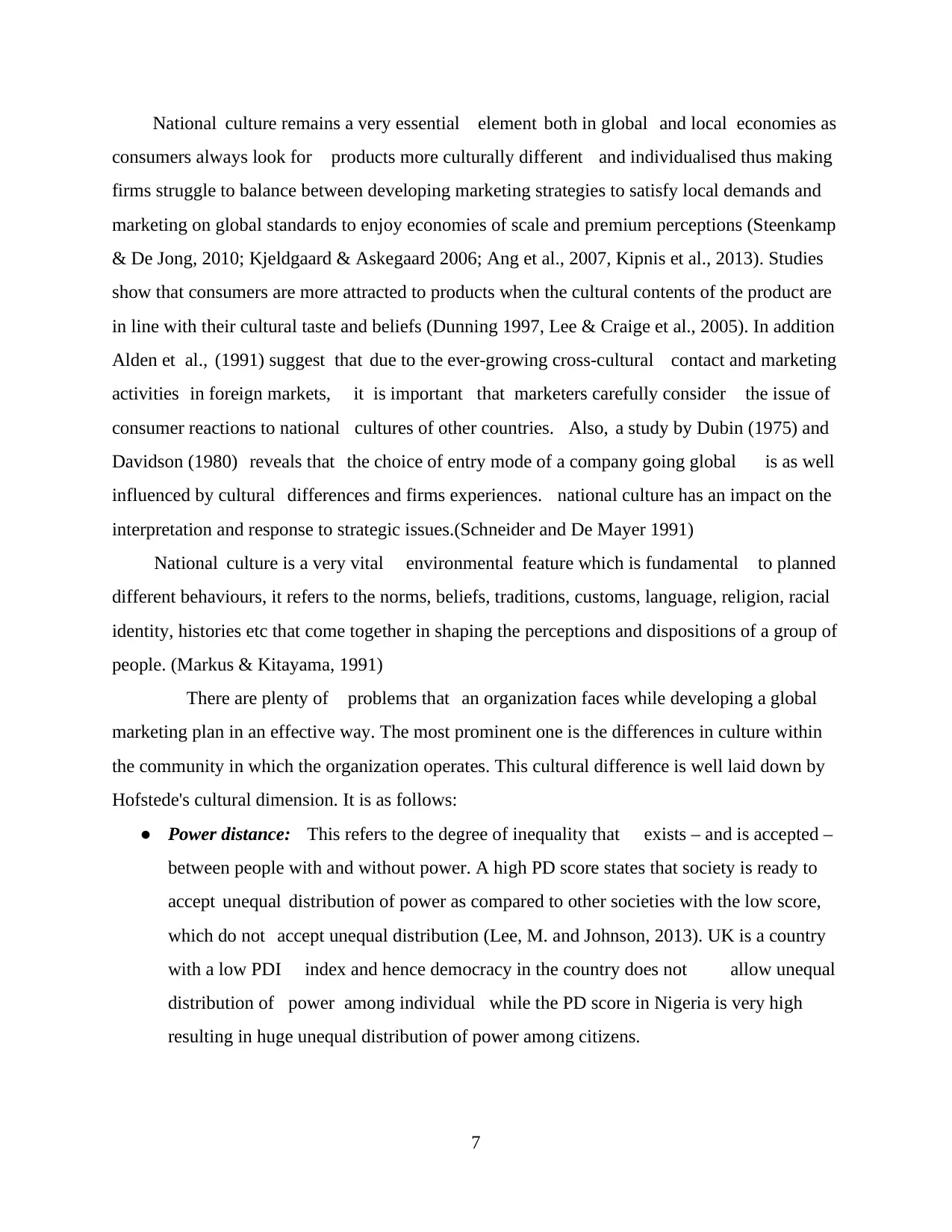
National culture remains a very essential element both in global and local economies as
consumers always look for products more culturally different and individualised thus making
firms struggle to balance between developing marketing strategies to satisfy local demands and
marketing on global standards to enjoy economies of scale and premium perceptions (Steenkamp
& De Jong, 2010; Kjeldgaard & Askegaard 2006; Ang et al., 2007, Kipnis et al., 2013). Studies
show that consumers are more attracted to products when the cultural contents of the product are
in line with their cultural taste and beliefs (Dunning 1997, Lee & Craige et al., 2005). In addition
Alden et al., (1991) suggest that due to the ever-growing cross-cultural contact and marketing
activities in foreign markets, it is important that marketers carefully consider the issue of
consumer reactions to national cultures of other countries. Also, a study by Dubin (1975) and
Davidson (1980) reveals that the choice of entry mode of a company going global is as well
influenced by cultural differences and firms experiences. national culture has an impact on the
interpretation and response to strategic issues.(Schneider and De Mayer 1991)
National culture is a very vital environmental feature which is fundamental to planned
different behaviours, it refers to the norms, beliefs, traditions, customs, language, religion, racial
identity, histories etc that come together in shaping the perceptions and dispositions of a group of
people. (Markus & Kitayama, 1991)
There are plenty of problems that an organization faces while developing a global
marketing plan in an effective way. The most prominent one is the differences in culture within
the community in which the organization operates. This cultural difference is well laid down by
Hofstede's cultural dimension. It is as follows:
● Power distance: This refers to the degree of inequality that exists – and is accepted –
between people with and without power. A high PD score states that society is ready to
accept unequal distribution of power as compared to other societies with the low score,
which do not accept unequal distribution (Lee, M. and Johnson, 2013). UK is a country
with a low PDI index and hence democracy in the country does not allow unequal
distribution of power among individual while the PD score in Nigeria is very high
resulting in huge unequal distribution of power among citizens.
7
consumers always look for products more culturally different and individualised thus making
firms struggle to balance between developing marketing strategies to satisfy local demands and
marketing on global standards to enjoy economies of scale and premium perceptions (Steenkamp
& De Jong, 2010; Kjeldgaard & Askegaard 2006; Ang et al., 2007, Kipnis et al., 2013). Studies
show that consumers are more attracted to products when the cultural contents of the product are
in line with their cultural taste and beliefs (Dunning 1997, Lee & Craige et al., 2005). In addition
Alden et al., (1991) suggest that due to the ever-growing cross-cultural contact and marketing
activities in foreign markets, it is important that marketers carefully consider the issue of
consumer reactions to national cultures of other countries. Also, a study by Dubin (1975) and
Davidson (1980) reveals that the choice of entry mode of a company going global is as well
influenced by cultural differences and firms experiences. national culture has an impact on the
interpretation and response to strategic issues.(Schneider and De Mayer 1991)
National culture is a very vital environmental feature which is fundamental to planned
different behaviours, it refers to the norms, beliefs, traditions, customs, language, religion, racial
identity, histories etc that come together in shaping the perceptions and dispositions of a group of
people. (Markus & Kitayama, 1991)
There are plenty of problems that an organization faces while developing a global
marketing plan in an effective way. The most prominent one is the differences in culture within
the community in which the organization operates. This cultural difference is well laid down by
Hofstede's cultural dimension. It is as follows:
● Power distance: This refers to the degree of inequality that exists – and is accepted –
between people with and without power. A high PD score states that society is ready to
accept unequal distribution of power as compared to other societies with the low score,
which do not accept unequal distribution (Lee, M. and Johnson, 2013). UK is a country
with a low PDI index and hence democracy in the country does not allow unequal
distribution of power among individual while the PD score in Nigeria is very high
resulting in huge unequal distribution of power among citizens.
7
Paraphrase This Document
Need a fresh take? Get an instant paraphrase of this document with our AI Paraphraser
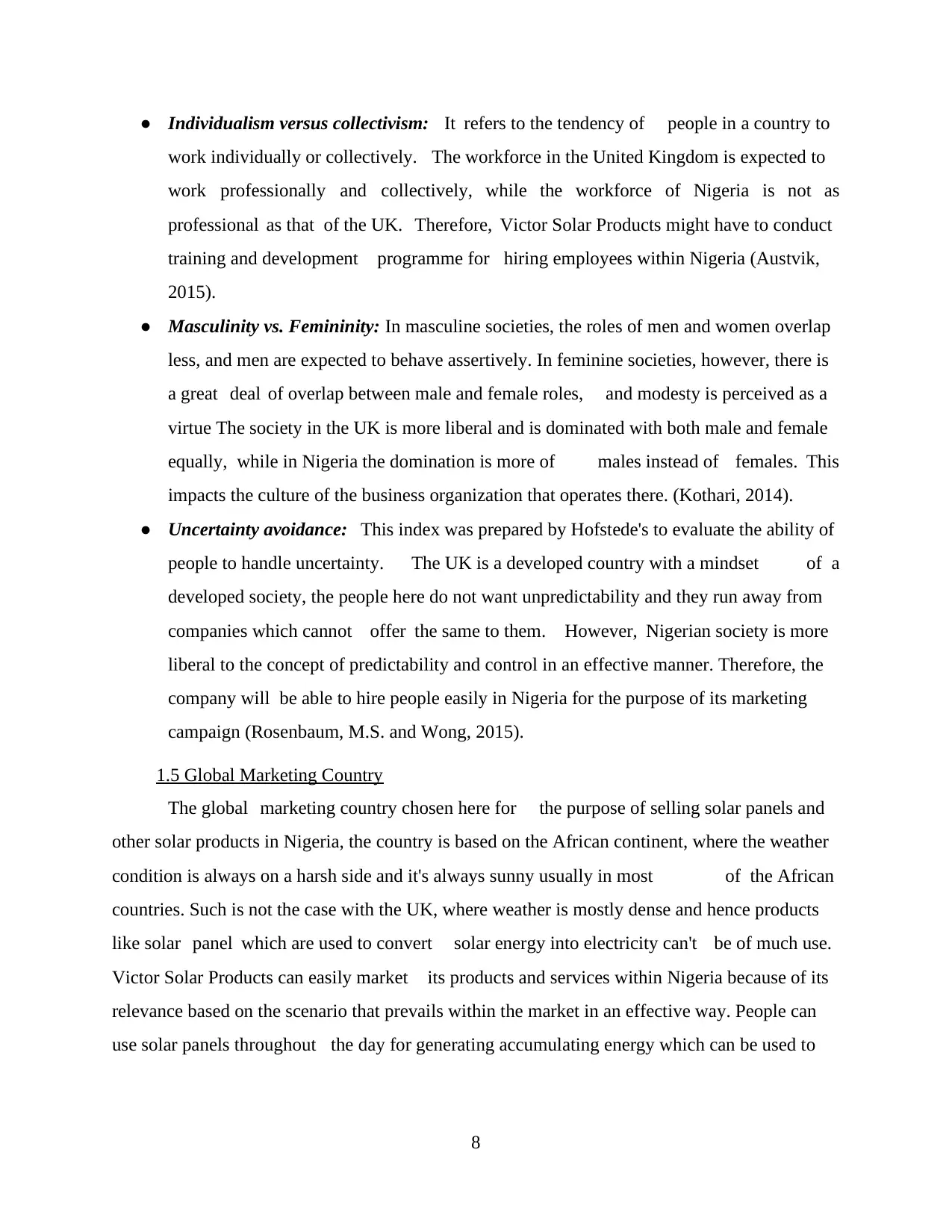
● Individualism versus collectivism: It refers to the tendency of people in a country to
work individually or collectively. The workforce in the United Kingdom is expected to
work professionally and collectively, while the workforce of Nigeria is not as
professional as that of the UK. Therefore, Victor Solar Products might have to conduct
training and development programme for hiring employees within Nigeria (Austvik,
2015).
● Masculinity vs. Femininity: In masculine societies, the roles of men and women overlap
less, and men are expected to behave assertively. In feminine societies, however, there is
a great deal of overlap between male and female roles, and modesty is perceived as a
virtue The society in the UK is more liberal and is dominated with both male and female
equally, while in Nigeria the domination is more of males instead of females. This
impacts the culture of the business organization that operates there. (Kothari, 2014).
● Uncertainty avoidance: This index was prepared by Hofstede's to evaluate the ability of
people to handle uncertainty. The UK is a developed country with a mindset of a
developed society, the people here do not want unpredictability and they run away from
companies which cannot offer the same to them. However, Nigerian society is more
liberal to the concept of predictability and control in an effective manner. Therefore, the
company will be able to hire people easily in Nigeria for the purpose of its marketing
campaign (Rosenbaum, M.S. and Wong, 2015).
1.5 Global Marketing Country
The global marketing country chosen here for the purpose of selling solar panels and
other solar products in Nigeria, the country is based on the African continent, where the weather
condition is always on a harsh side and it's always sunny usually in most of the African
countries. Such is not the case with the UK, where weather is mostly dense and hence products
like solar panel which are used to convert solar energy into electricity can't be of much use.
Victor Solar Products can easily market its products and services within Nigeria because of its
relevance based on the scenario that prevails within the market in an effective way. People can
use solar panels throughout the day for generating accumulating energy which can be used to
8
work individually or collectively. The workforce in the United Kingdom is expected to
work professionally and collectively, while the workforce of Nigeria is not as
professional as that of the UK. Therefore, Victor Solar Products might have to conduct
training and development programme for hiring employees within Nigeria (Austvik,
2015).
● Masculinity vs. Femininity: In masculine societies, the roles of men and women overlap
less, and men are expected to behave assertively. In feminine societies, however, there is
a great deal of overlap between male and female roles, and modesty is perceived as a
virtue The society in the UK is more liberal and is dominated with both male and female
equally, while in Nigeria the domination is more of males instead of females. This
impacts the culture of the business organization that operates there. (Kothari, 2014).
● Uncertainty avoidance: This index was prepared by Hofstede's to evaluate the ability of
people to handle uncertainty. The UK is a developed country with a mindset of a
developed society, the people here do not want unpredictability and they run away from
companies which cannot offer the same to them. However, Nigerian society is more
liberal to the concept of predictability and control in an effective manner. Therefore, the
company will be able to hire people easily in Nigeria for the purpose of its marketing
campaign (Rosenbaum, M.S. and Wong, 2015).
1.5 Global Marketing Country
The global marketing country chosen here for the purpose of selling solar panels and
other solar products in Nigeria, the country is based on the African continent, where the weather
condition is always on a harsh side and it's always sunny usually in most of the African
countries. Such is not the case with the UK, where weather is mostly dense and hence products
like solar panel which are used to convert solar energy into electricity can't be of much use.
Victor Solar Products can easily market its products and services within Nigeria because of its
relevance based on the scenario that prevails within the market in an effective way. People can
use solar panels throughout the day for generating accumulating energy which can be used to
8
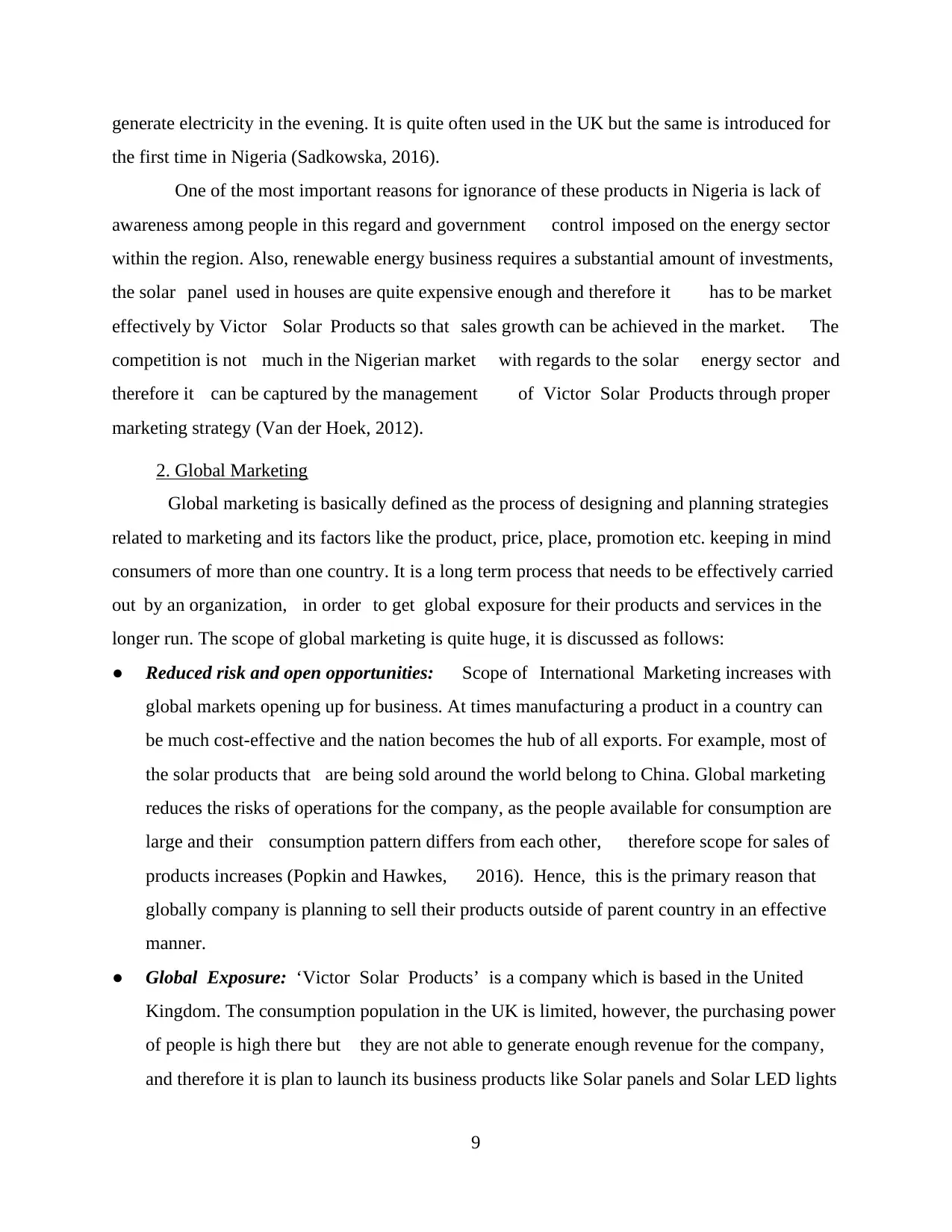
generate electricity in the evening. It is quite often used in the UK but the same is introduced for
the first time in Nigeria (Sadkowska, 2016).
One of the most important reasons for ignorance of these products in Nigeria is lack of
awareness among people in this regard and government control imposed on the energy sector
within the region. Also, renewable energy business requires a substantial amount of investments,
the solar panel used in houses are quite expensive enough and therefore it has to be market
effectively by Victor Solar Products so that sales growth can be achieved in the market. The
competition is not much in the Nigerian market with regards to the solar energy sector and
therefore it can be captured by the management of Victor Solar Products through proper
marketing strategy (Van der Hoek, 2012).
2. Global Marketing
Global marketing is basically defined as the process of designing and planning strategies
related to marketing and its factors like the product, price, place, promotion etc. keeping in mind
consumers of more than one country. It is a long term process that needs to be effectively carried
out by an organization, in order to get global exposure for their products and services in the
longer run. The scope of global marketing is quite huge, it is discussed as follows:
● Reduced risk and open opportunities: Scope of International Marketing increases with
global markets opening up for business. At times manufacturing a product in a country can
be much cost-effective and the nation becomes the hub of all exports. For example, most of
the solar products that are being sold around the world belong to China. Global marketing
reduces the risks of operations for the company, as the people available for consumption are
large and their consumption pattern differs from each other, therefore scope for sales of
products increases (Popkin and Hawkes, 2016). Hence, this is the primary reason that
globally company is planning to sell their products outside of parent country in an effective
manner.
● Global Exposure: ‘Victor Solar Products’ is a company which is based in the United
Kingdom. The consumption population in the UK is limited, however, the purchasing power
of people is high there but they are not able to generate enough revenue for the company,
and therefore it is plan to launch its business products like Solar panels and Solar LED lights
9
the first time in Nigeria (Sadkowska, 2016).
One of the most important reasons for ignorance of these products in Nigeria is lack of
awareness among people in this regard and government control imposed on the energy sector
within the region. Also, renewable energy business requires a substantial amount of investments,
the solar panel used in houses are quite expensive enough and therefore it has to be market
effectively by Victor Solar Products so that sales growth can be achieved in the market. The
competition is not much in the Nigerian market with regards to the solar energy sector and
therefore it can be captured by the management of Victor Solar Products through proper
marketing strategy (Van der Hoek, 2012).
2. Global Marketing
Global marketing is basically defined as the process of designing and planning strategies
related to marketing and its factors like the product, price, place, promotion etc. keeping in mind
consumers of more than one country. It is a long term process that needs to be effectively carried
out by an organization, in order to get global exposure for their products and services in the
longer run. The scope of global marketing is quite huge, it is discussed as follows:
● Reduced risk and open opportunities: Scope of International Marketing increases with
global markets opening up for business. At times manufacturing a product in a country can
be much cost-effective and the nation becomes the hub of all exports. For example, most of
the solar products that are being sold around the world belong to China. Global marketing
reduces the risks of operations for the company, as the people available for consumption are
large and their consumption pattern differs from each other, therefore scope for sales of
products increases (Popkin and Hawkes, 2016). Hence, this is the primary reason that
globally company is planning to sell their products outside of parent country in an effective
manner.
● Global Exposure: ‘Victor Solar Products’ is a company which is based in the United
Kingdom. The consumption population in the UK is limited, however, the purchasing power
of people is high there but they are not able to generate enough revenue for the company,
and therefore it is plan to launch its business products like Solar panels and Solar LED lights
9
⊘ This is a preview!⊘
Do you want full access?
Subscribe today to unlock all pages.

Trusted by 1+ million students worldwide
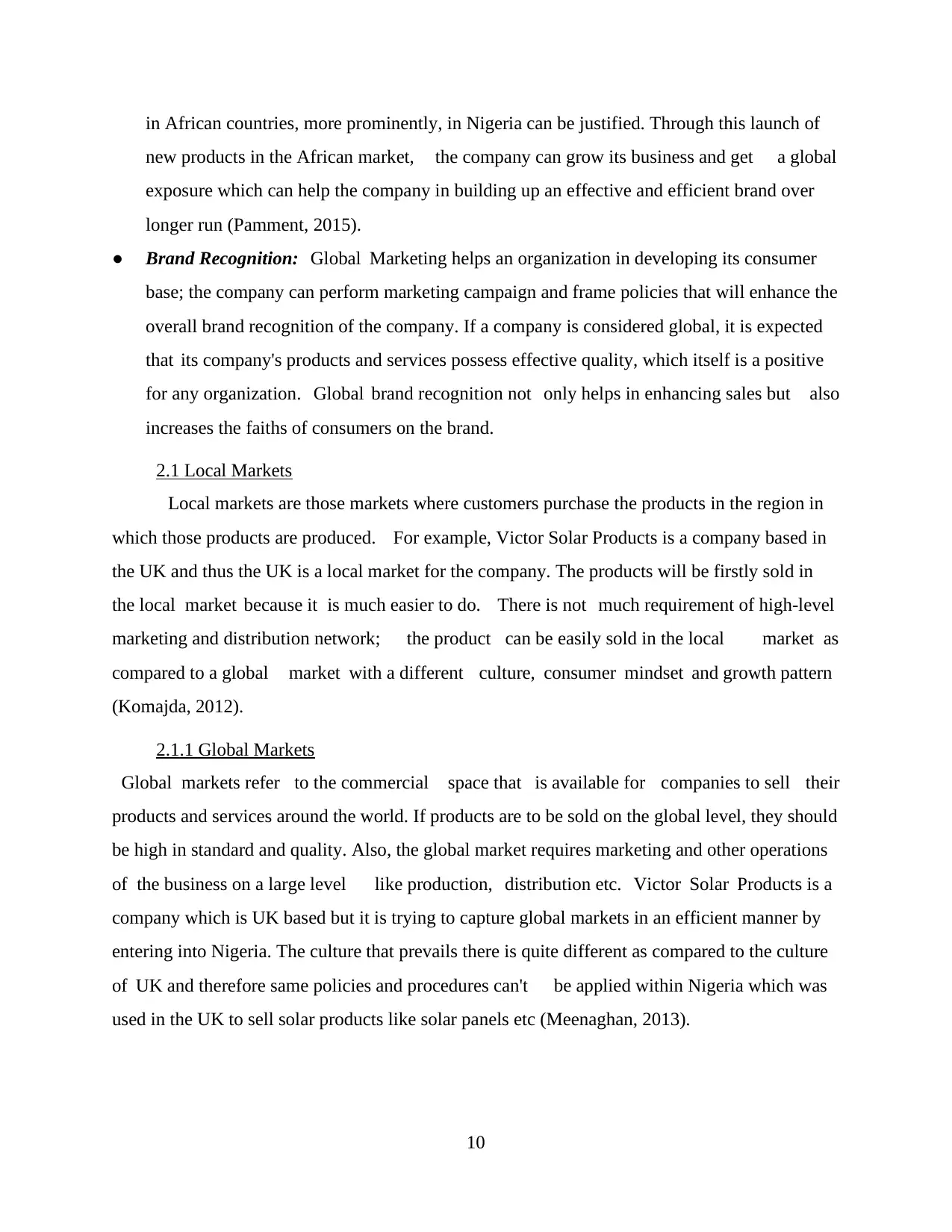
in African countries, more prominently, in Nigeria can be justified. Through this launch of
new products in the African market, the company can grow its business and get a global
exposure which can help the company in building up an effective and efficient brand over
longer run (Pamment, 2015).
● Brand Recognition: Global Marketing helps an organization in developing its consumer
base; the company can perform marketing campaign and frame policies that will enhance the
overall brand recognition of the company. If a company is considered global, it is expected
that its company's products and services possess effective quality, which itself is a positive
for any organization. Global brand recognition not only helps in enhancing sales but also
increases the faiths of consumers on the brand.
2.1 Local Markets
Local markets are those markets where customers purchase the products in the region in
which those products are produced. For example, Victor Solar Products is a company based in
the UK and thus the UK is a local market for the company. The products will be firstly sold in
the local market because it is much easier to do. There is not much requirement of high-level
marketing and distribution network; the product can be easily sold in the local market as
compared to a global market with a different culture, consumer mindset and growth pattern
(Komajda, 2012).
2.1.1 Global Markets
Global markets refer to the commercial space that is available for companies to sell their
products and services around the world. If products are to be sold on the global level, they should
be high in standard and quality. Also, the global market requires marketing and other operations
of the business on a large level like production, distribution etc. Victor Solar Products is a
company which is UK based but it is trying to capture global markets in an efficient manner by
entering into Nigeria. The culture that prevails there is quite different as compared to the culture
of UK and therefore same policies and procedures can't be applied within Nigeria which was
used in the UK to sell solar products like solar panels etc (Meenaghan, 2013).
10
new products in the African market, the company can grow its business and get a global
exposure which can help the company in building up an effective and efficient brand over
longer run (Pamment, 2015).
● Brand Recognition: Global Marketing helps an organization in developing its consumer
base; the company can perform marketing campaign and frame policies that will enhance the
overall brand recognition of the company. If a company is considered global, it is expected
that its company's products and services possess effective quality, which itself is a positive
for any organization. Global brand recognition not only helps in enhancing sales but also
increases the faiths of consumers on the brand.
2.1 Local Markets
Local markets are those markets where customers purchase the products in the region in
which those products are produced. For example, Victor Solar Products is a company based in
the UK and thus the UK is a local market for the company. The products will be firstly sold in
the local market because it is much easier to do. There is not much requirement of high-level
marketing and distribution network; the product can be easily sold in the local market as
compared to a global market with a different culture, consumer mindset and growth pattern
(Komajda, 2012).
2.1.1 Global Markets
Global markets refer to the commercial space that is available for companies to sell their
products and services around the world. If products are to be sold on the global level, they should
be high in standard and quality. Also, the global market requires marketing and other operations
of the business on a large level like production, distribution etc. Victor Solar Products is a
company which is UK based but it is trying to capture global markets in an efficient manner by
entering into Nigeria. The culture that prevails there is quite different as compared to the culture
of UK and therefore same policies and procedures can't be applied within Nigeria which was
used in the UK to sell solar products like solar panels etc (Meenaghan, 2013).
10
Paraphrase This Document
Need a fresh take? Get an instant paraphrase of this document with our AI Paraphraser
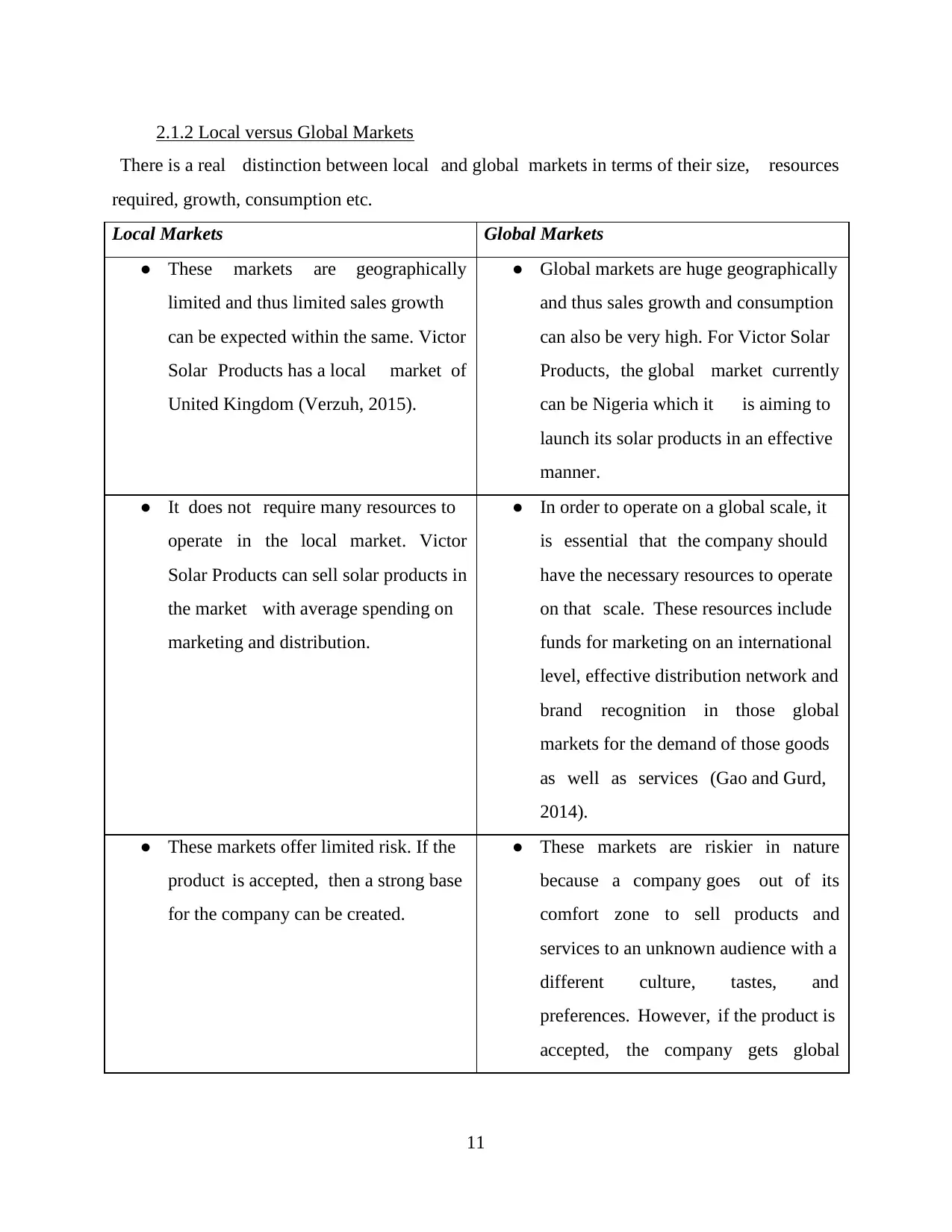
2.1.2 Local versus Global Markets
There is a real distinction between local and global markets in terms of their size, resources
required, growth, consumption etc.
Local Markets Global Markets
● These markets are geographically
limited and thus limited sales growth
can be expected within the same. Victor
Solar Products has a local market of
United Kingdom (Verzuh, 2015).
● Global markets are huge geographically
and thus sales growth and consumption
can also be very high. For Victor Solar
Products, the global market currently
can be Nigeria which it is aiming to
launch its solar products in an effective
manner.
● It does not require many resources to
operate in the local market. Victor
Solar Products can sell solar products in
the market with average spending on
marketing and distribution.
● In order to operate on a global scale, it
is essential that the company should
have the necessary resources to operate
on that scale. These resources include
funds for marketing on an international
level, effective distribution network and
brand recognition in those global
markets for the demand of those goods
as well as services (Gao and Gurd,
2014).
● These markets offer limited risk. If the
product is accepted, then a strong base
for the company can be created.
● These markets are riskier in nature
because a company goes out of its
comfort zone to sell products and
services to an unknown audience with a
different culture, tastes, and
preferences. However, if the product is
accepted, the company gets global
11
There is a real distinction between local and global markets in terms of their size, resources
required, growth, consumption etc.
Local Markets Global Markets
● These markets are geographically
limited and thus limited sales growth
can be expected within the same. Victor
Solar Products has a local market of
United Kingdom (Verzuh, 2015).
● Global markets are huge geographically
and thus sales growth and consumption
can also be very high. For Victor Solar
Products, the global market currently
can be Nigeria which it is aiming to
launch its solar products in an effective
manner.
● It does not require many resources to
operate in the local market. Victor
Solar Products can sell solar products in
the market with average spending on
marketing and distribution.
● In order to operate on a global scale, it
is essential that the company should
have the necessary resources to operate
on that scale. These resources include
funds for marketing on an international
level, effective distribution network and
brand recognition in those global
markets for the demand of those goods
as well as services (Gao and Gurd,
2014).
● These markets offer limited risk. If the
product is accepted, then a strong base
for the company can be created.
● These markets are riskier in nature
because a company goes out of its
comfort zone to sell products and
services to an unknown audience with a
different culture, tastes, and
preferences. However, if the product is
accepted, the company gets global
11
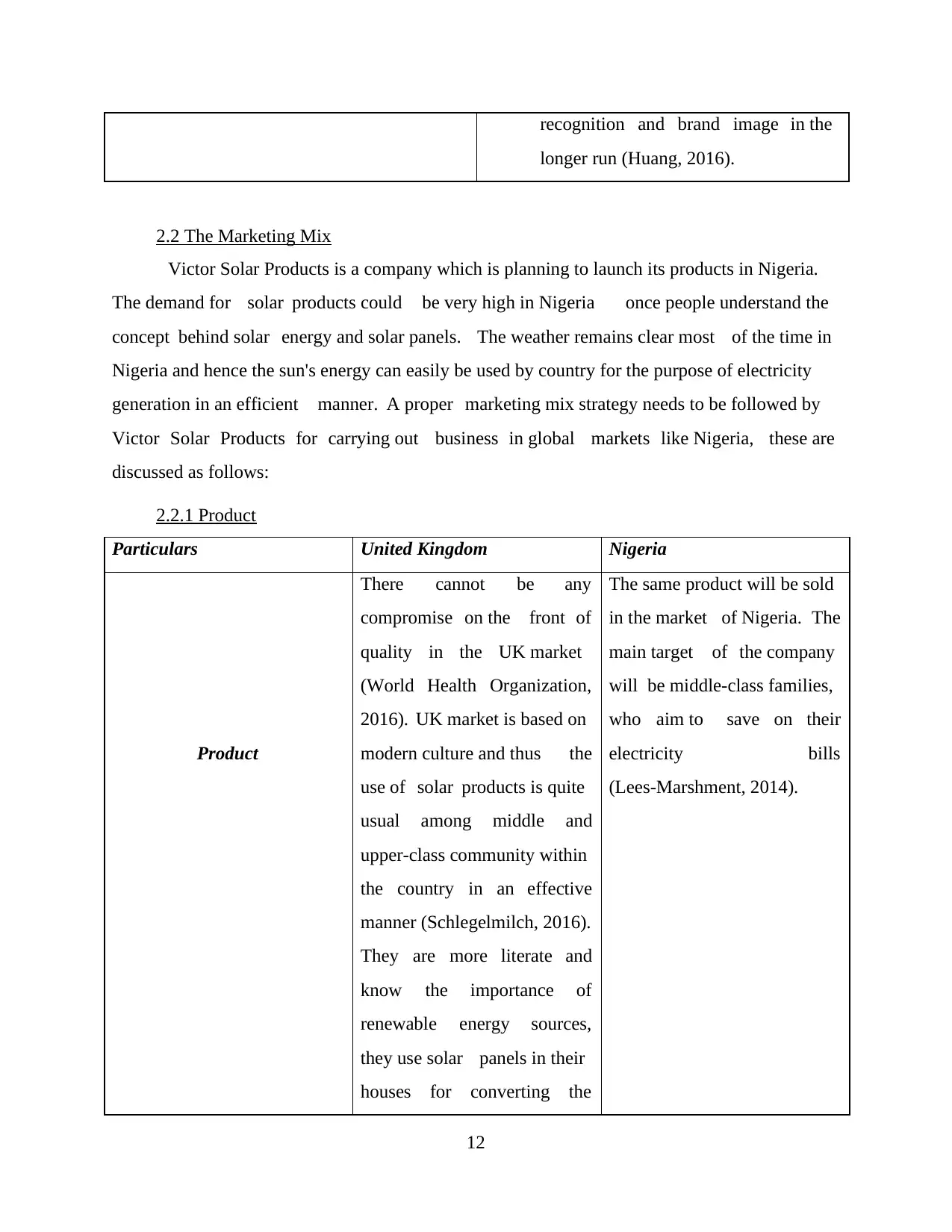
recognition and brand image in the
longer run (Huang, 2016).
2.2 The Marketing Mix
Victor Solar Products is a company which is planning to launch its products in Nigeria.
The demand for solar products could be very high in Nigeria once people understand the
concept behind solar energy and solar panels. The weather remains clear most of the time in
Nigeria and hence the sun's energy can easily be used by country for the purpose of electricity
generation in an efficient manner. A proper marketing mix strategy needs to be followed by
Victor Solar Products for carrying out business in global markets like Nigeria, these are
discussed as follows:
2.2.1 Product
Particulars United Kingdom Nigeria
Product
There cannot be any
compromise on the front of
quality in the UK market
(World Health Organization,
2016). UK market is based on
modern culture and thus the
use of solar products is quite
usual among middle and
upper-class community within
the country in an effective
manner (Schlegelmilch, 2016).
They are more literate and
know the importance of
renewable energy sources,
they use solar panels in their
houses for converting the
The same product will be sold
in the market of Nigeria. The
main target of the company
will be middle-class families,
who aim to save on their
electricity bills
(Lees-Marshment, 2014).
12
longer run (Huang, 2016).
2.2 The Marketing Mix
Victor Solar Products is a company which is planning to launch its products in Nigeria.
The demand for solar products could be very high in Nigeria once people understand the
concept behind solar energy and solar panels. The weather remains clear most of the time in
Nigeria and hence the sun's energy can easily be used by country for the purpose of electricity
generation in an efficient manner. A proper marketing mix strategy needs to be followed by
Victor Solar Products for carrying out business in global markets like Nigeria, these are
discussed as follows:
2.2.1 Product
Particulars United Kingdom Nigeria
Product
There cannot be any
compromise on the front of
quality in the UK market
(World Health Organization,
2016). UK market is based on
modern culture and thus the
use of solar products is quite
usual among middle and
upper-class community within
the country in an effective
manner (Schlegelmilch, 2016).
They are more literate and
know the importance of
renewable energy sources,
they use solar panels in their
houses for converting the
The same product will be sold
in the market of Nigeria. The
main target of the company
will be middle-class families,
who aim to save on their
electricity bills
(Lees-Marshment, 2014).
12
⊘ This is a preview!⊘
Do you want full access?
Subscribe today to unlock all pages.

Trusted by 1+ million students worldwide
1 out of 21
Related Documents
Your All-in-One AI-Powered Toolkit for Academic Success.
+13062052269
info@desklib.com
Available 24*7 on WhatsApp / Email
![[object Object]](/_next/static/media/star-bottom.7253800d.svg)
Unlock your academic potential
Copyright © 2020–2026 A2Z Services. All Rights Reserved. Developed and managed by ZUCOL.





